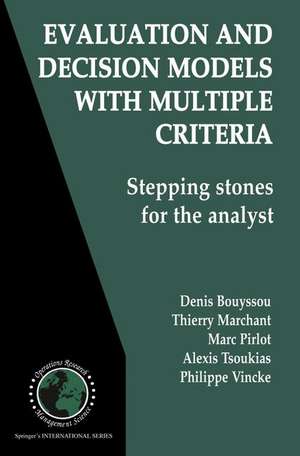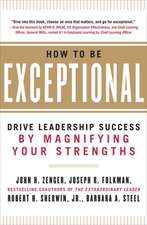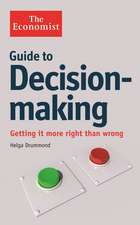Evaluation and Decision Models with Multiple Criteria: Stepping stones for the analyst: International Series in Operations Research & Management Science, cartea 86
Autor Denis Bouyssou, Thierry Marchant, Marc Pirlot, Alexis Tsoukias, Philippe Vinckeen Limba Engleză Hardback – 10 feb 2006
Our earlier companion volume, Evaluation and Decision Models, heavily criticised formal models but also argued that they could be useful. On the other hand, Evaluation and Decision Models with Multiple Criteria is a guide aimed at helping the analyst to choose a model and use it consistently. We propose a sound analysis of techniques and our presentation can be extended to most decision and evaluation models as a "decision aiding methodology".
This volume is intended for the enlightened practitioner, for anyone who uses decision or evaluation models---for research or for applications---and is willing to question his practice, to have a deeper understanding of what he does.
| Toate formatele și edițiile | Preț | Express |
|---|---|---|
| Paperback (1) | 898.13 lei 6-8 săpt. | |
| Springer Us – 11 feb 2011 | 898.13 lei 6-8 săpt. | |
| Hardback (1) | 655.13 lei 6-8 săpt. | |
| Springer Us – 10 feb 2006 | 655.13 lei 6-8 săpt. |
Din seria International Series in Operations Research & Management Science
- 20%
 Preț: 331.25 lei
Preț: 331.25 lei - 20%
 Preț: 570.61 lei
Preț: 570.61 lei - 18%
 Preț: 1132.02 lei
Preț: 1132.02 lei - 18%
 Preț: 773.72 lei
Preț: 773.72 lei -
 Preț: 170.39 lei
Preț: 170.39 lei - 17%
 Preț: 459.34 lei
Preț: 459.34 lei - 17%
 Preț: 360.47 lei
Preț: 360.47 lei -
 Preț: 263.40 lei
Preț: 263.40 lei - 24%
 Preț: 905.30 lei
Preț: 905.30 lei - 17%
 Preț: 460.08 lei
Preț: 460.08 lei - 17%
 Preț: 459.34 lei
Preț: 459.34 lei - 20%
 Preț: 631.58 lei
Preț: 631.58 lei - 13%
 Preț: 480.00 lei
Preț: 480.00 lei - 18%
 Preț: 738.28 lei
Preț: 738.28 lei - 18%
 Preț: 1225.94 lei
Preț: 1225.94 lei - 18%
 Preț: 948.92 lei
Preț: 948.92 lei - 18%
 Preț: 703.88 lei
Preț: 703.88 lei - 18%
 Preț: 957.44 lei
Preț: 957.44 lei - 15%
 Preț: 651.84 lei
Preț: 651.84 lei - 20%
 Preț: 336.21 lei
Preț: 336.21 lei - 15%
 Preț: 641.03 lei
Preț: 641.03 lei -
 Preț: 404.29 lei
Preț: 404.29 lei - 18%
 Preț: 950.21 lei
Preț: 950.21 lei - 15%
 Preț: 649.06 lei
Preț: 649.06 lei - 18%
 Preț: 725.75 lei
Preț: 725.75 lei -
 Preț: 394.12 lei
Preț: 394.12 lei - 18%
 Preț: 951.47 lei
Preț: 951.47 lei - 15%
 Preț: 639.59 lei
Preț: 639.59 lei - 18%
 Preț: 773.06 lei
Preț: 773.06 lei - 18%
 Preț: 889.29 lei
Preț: 889.29 lei - 15%
 Preț: 655.60 lei
Preț: 655.60 lei - 15%
 Preț: 640.06 lei
Preț: 640.06 lei - 15%
 Preț: 583.93 lei
Preț: 583.93 lei
Preț: 655.13 lei
Preț vechi: 770.73 lei
-15% Nou
Puncte Express: 983
Preț estimativ în valută:
125.36€ • 131.15$ • 104.14£
125.36€ • 131.15$ • 104.14£
Carte tipărită la comandă
Livrare economică 02-16 aprilie
Preluare comenzi: 021 569.72.76
Specificații
ISBN-13: 9780387310985
ISBN-10: 0387310983
Pagini: 468
Ilustrații: XVI, 445 p.
Dimensiuni: 156 x 235 x 31 mm
Greutate: 0.83 kg
Ediția:2006
Editura: Springer Us
Colecția Springer
Seria International Series in Operations Research & Management Science
Locul publicării:New York, NY, United States
ISBN-10: 0387310983
Pagini: 468
Ilustrații: XVI, 445 p.
Dimensiuni: 156 x 235 x 31 mm
Greutate: 0.83 kg
Ediția:2006
Editura: Springer Us
Colecția Springer
Seria International Series in Operations Research & Management Science
Locul publicării:New York, NY, United States
Public țintă
Professional/practitionerCuprins
and Preview.- Problem Formulation and Structuring: The Decision Aiding Process.- Numbers and Preferences.- Aggregation-Overture.- Aggregation Procedures.- Multi-Dimensional Preference Models.- Making Recommendation.- Conclusion and Perspectives.
Textul de pe ultima copertă
Formal decision and evaluation models are sets of explicit and well-defined rules to collect, assess, and process information in order to be able to make recommendations in decision and/or evaluation processes. They are so widespread that almost no one can pretend not to have used or suffered the consequences of one of them.
In our earlier companion volume, Evaluation and Decision Models, we heavily criticised formal models but we also argued that they could be useful. On the other hand, Evaluation and Decision Models with Multiple Criteria is a guide, a way of reasoning aimed at helping the analyst to choose a model and use it consistently. We propose, often using an axiomatic point of view, a sound analysis of techniques aimed at supporting the decision aiding process. Our presentation is carried out within a unique framework that can be extended to most decision and evaluation models, as a "decision aiding methodology".
Evaluation and Decision Models with Multiple Criteria is intended for the aware or enlightened practitioner, for anyone who uses decision or evaluation models---for research or for applications---and is willing to question his practice, to have a deeper understanding of what he does.
The authors of this book are European academics working in four different universities and research institutions. They teach in engineering, mathematics, computer science and psychology schools. Their background is quite varied: mathematics, economics, engineering, law and geology, but they are all active in decision support and more particularly in multiple criteria decision support. Preference modelling, fuzzy logic, aggregation techniques, social choice theory, artificial intelligence, problem structuring, measurement theory and Operational Research are among their special interests.
The authors are active in theoretical research on the foundations of decision aiding, mainly from an axiomatic point of view. Moreover, all the authors have been involved and continue to be engaged in a wide range of applications from software evaluation to location of a nuclear repository, through the rehabilitation of a sewer network or the location of high-voltage lines.
In our earlier companion volume, Evaluation and Decision Models, we heavily criticised formal models but we also argued that they could be useful. On the other hand, Evaluation and Decision Models with Multiple Criteria is a guide, a way of reasoning aimed at helping the analyst to choose a model and use it consistently. We propose, often using an axiomatic point of view, a sound analysis of techniques aimed at supporting the decision aiding process. Our presentation is carried out within a unique framework that can be extended to most decision and evaluation models, as a "decision aiding methodology".
Evaluation and Decision Models with Multiple Criteria is intended for the aware or enlightened practitioner, for anyone who uses decision or evaluation models---for research or for applications---and is willing to question his practice, to have a deeper understanding of what he does.
The authors of this book are European academics working in four different universities and research institutions. They teach in engineering, mathematics, computer science and psychology schools. Their background is quite varied: mathematics, economics, engineering, law and geology, but they are all active in decision support and more particularly in multiple criteria decision support. Preference modelling, fuzzy logic, aggregation techniques, social choice theory, artificial intelligence, problem structuring, measurement theory and Operational Research are among their special interests.
The authors are active in theoretical research on the foundations of decision aiding, mainly from an axiomatic point of view. Moreover, all the authors have been involved and continue to be engaged in a wide range of applications from software evaluation to location of a nuclear repository, through the rehabilitation of a sewer network or the location of high-voltage lines.
Caracteristici
Provides a "decision aiding methodology" based on the science of formal decision models that a decision analyst can apply to many decision problems with maximum flexibility The authors' unique decision aiding process is discussed step-by-step throughout the book. A step-by-step icon is placed in the margin whenever a decision aiding 'stepping stone' is discussed or a conclusion is presented Numerous examples and real world applications are used throughout the book to illustrate the primary components of the authors' decision-aiding processes of (1) developing a representation of the problem, (2) formulating the problem, (3) creating an evaluation model, and making a final recommendation Includes supplementary material: sn.pub/extras









